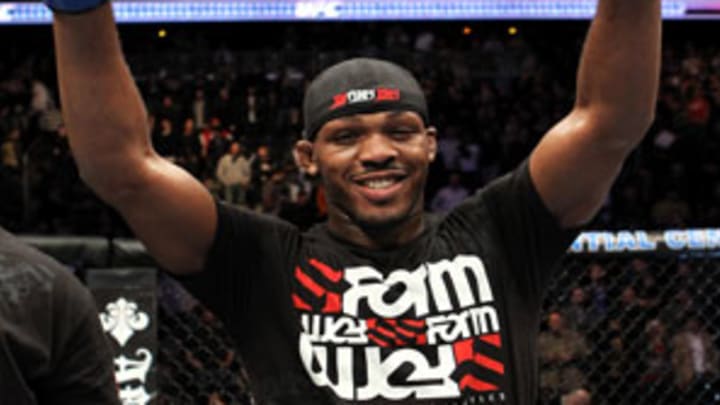Has Jones' challenge to Evans broken the UFC honor code?


You'd think that in a business of professional tough guys it would take more than one little comment to hurt so many feelings and bruise so many egos. You'd be wrong.
It started in an interview on Versus with Ariel Helwani, where light heavyweight phenom Jon Jones remarked that, if the UFC insisted on it, he'd fight his friend and training partner Rashad Evans. This was not only a break from the official policy at Greg Jackson's Albuquerque-based gym, it was also a direct contradiction of Jones' previous vows that he would never, ever fight Evans under any circumstances.
It was, in other words, the kind of thing you might say without thinking it through. It didn't take long before Evans -- driven by the age-old desire to make sure people knew he was no "punk" -- said sure, he'd fight Jones, too. Then when Jones defeated Mauricio "Shogun" Rua for the UFC light heavyweight title at UFC 128, there was nothing left for the UFC to do but shove Evans in the cage alongside Jones for one of the most awkward post-fight confrontations in recent memory.
It was enough to make you wonder, is this where we're headed in MMA? Is this the beginning of the end for gym-based loyalties? And if so, is that a good thing?
To some fans, it seems like a non-issue. If you're in this sport to be champ, they say, that should be more important to you than whatever friendships you've formed on the mats. Be friends before the fight. Be friends after the fight. But when the time comes to take your shot at the top spot, leave all that fellow feeling in the locker room.
That makes a certain degree of sense, but it's also much easier to be so wonderfully detached when it's other people's personal relationships you're talking about, and not your own.
Forget the violence inherent in the sport: MMA fighters are used to that. They beat their friends up for free on every hard sparring day, so cranking up the volume a little on fight night isn't so abhorrent a thought.
What's more troubling for fighters is that, depending on how the fight plays out, you're either going to be propelling your career forward on the merits of your friend's misfortune, or vice versa. How many of us would like to see our path to success go straight over our best friend's broken body? How many of us could nonchalantly go back to being friends after something like that?
Of course, for Jones and Evans, it's not so much about friendship. They may have been training partners at Jackson's MMA, but they were never close buddies. For them -- as well as for Jackson, who insists he'll stay out of this fight altogether -- it's more about the training environment this development creates.
Think of it this way: if I know my sneaky guillotine is the my go-to move in a fight, why would I ever pull it out in training against a guy I might some day need to use it on? And even if I did use it to get one meaningless training room tap, why would I ever help that same guy by explaining to him afterwards how he got caught with it?
When you hear Jackson reference a "cooperative, competitive training dynamic," this is exactly what he's talking about. If fighters don't feel comfortable enough to not only pull out their best stuff in the gym, but use it to make their training partners better, then you cease to have a team and start having a collection of self-serving sparring partners.
Again, is that necessarily bad? Those who come from the world of boxing would probably say no. There, you don't see tight-knit teams of fighters who vow never to raise their fists against each other in sanctioned combat. What you see instead are paid sparring partners and a dearth of interpersonal allegiances.
Maybe that's fine. Maybe it's inevitable. Certainly it avoids situations like the one that's unfolded in the past week, where the former champ Evans accuses the current champ of being a "Judas," and does his best to burn all the bridges between himself and his former camp.
But if MMA fans are getting the fights they want to see at the expense of the very dynamic that allows fighters to help each other improve, what will we really have accomplished? Better yet, will fans and fighters actually like this cutthroat new world once they have it?
